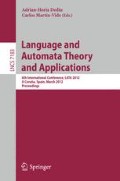Abstract
In this paper we introduce a class of Petri nets, called catalytic Petri nets, and a suitable firing strategy where transitions are fired only when they use tokens from specific places, called catalytic places. By establishing a one-to-one relationship with catalytic membrane systems, we can prove that the class of catalytic Petri nets with at least two catalytic places is Turing complete.
Work partially supported by the Regione Autonoma della Sardegna; grants L.R. 7/2007 CRP2-120 (Project TESLA) and CRP-17285 (Project TRICS).
Access this chapter
Tax calculation will be finalised at checkout
Purchases are for personal use only
Preview
Unable to display preview. Download preview PDF.
References
Agrigoroaiei, O., Ciobanu, G.: Flattening the Transition P Systems with Dissolution. In: Gheorghe, M., Hinze, T., Păun, G., Rozenberg, G., Salomaa, A. (eds.) CMC 2010. LNCS, vol. 6501, pp. 53–64. Springer, Heidelberg (2010)
Alberts, B., Johnson, A., Walter, P., Lewis, J.: Molecular Biology of the Cell. Garland Publishing, New York (2002)
Burkhard, H.D.: On Priorities of Parallelism. In: Salwicki, A. (ed.) Logic of Programs 1980. LNCS, vol. 148, pp. 86–97. Springer, Heidelberg (1983)
Burkhard, H.D.: Ordered firing in Petri nets. Elektronische Informationsverarbeitung und Kybernetik 17(2/3), 71–86 (1981)
Ciardo, G.: Petri Nets with Marking-Dependent Arc Cardinality: Properties and Analysis. In: Valette, R. (ed.) ICATPN 1994. LNCS, vol. 815, pp. 179–198. Springer, Heidelberg (1994)
Ciobanu, G., Pan, L., Păun, G., Pérez-Jiménez, M.J.: P systems with minimal parallelism. Theoretical Computer Science 378(1), 117–130 (2007)
Ciobanu, G., Pérez-Jiménez, M.J., Păun, G. (eds.): Applications of Membrane Computing. Natural Computing Series. Springer, Heidelberg (2006)
Dufourd, C., Finkel, A., Schnoebelen, P.: Reset Nets Between Decidability and Undecidability. In: Larsen, K.G., Skyum, S., Winskel, G. (eds.) ICALP 1998. LNCS, vol. 1443, pp. 103–115. Springer, Heidelberg (1998)
Esparza, J.: Decidability and complexity of Petri net problems - an introduction. In: Reisig, W., Rozenberg, G. (eds.) APN 1998. LNCS, vol. 1491, pp. 374–428. Springer, Heidelberg (1998)
Esparza, J., Nielsen, M.: Decidability issues for Petri nets - a survey. Bulletin of the EATCS 52, 244–262 (1994)
Finkel, A., Geeraerts, G., Raskin, J.F., Begin, L.V.: On the ω-language expressive power of extended Petri nets. Theor. Comput. Sci. 356(3), 374–386 (2006)
Freund, R., Kari, L., Oswald, M., Sosík, P.: Computationally universal P systems without priorities: two catalysts are sufficient. Theoretical Computer Science 330(2), 251–266 (2005)
Geeraerts, G.: On the expressive power of Petri nets with transfer arcs vs. Petri nets with reset arcs. Tech. Rep. 572, Université Libre de Bruxelles (2007)
Hack, M.: Decidability Questions for Petri Nets. In: Outstanding Dissertations in the Computer Sciences. Garland Publishing, New York (1975)
Jantzen, M., Zetzsche, G.: Labeled Step Sequences in Petri Nets. In: van Hee, K.M., Valk, R. (eds.) PETRI NETS 2008. LNCS, vol. 5062, pp. 270–287. Springer, Heidelberg (2008)
Kleijn, J., Koutny, M.: Petri nets and membrane computing. In: Păun, G., Rozenberg, G., Salomaa, A. (eds.) The Oxford Handbook of Membrane Computing, pp. 389–412. Oxford University Press (2010)
Kleijn, J., Koutny, M., Rozenberg, G.: Towards a Petri Net Semantics for Membrane Systems. In: Freund, R., Păun, G., Rozenberg, G., Salomaa, A. (eds.) WMC 2005. LNCS, vol. 3850, pp. 292–309. Springer, Heidelberg (2006)
Kosaraju, S.R.: Decidability of reachability in vector addition systems (preliminary version). In: Proceedings of the Fourteenth Annual ACM Symposium on Theory of Computing, pp. 267–281. ACM (1982)
Montanari, U., Rossi, F.: Contextual nets. Acta Informatica 32(6) (1995)
Păun, G.: Membrane Computing. An Introduction. Natural Computing Series. Springer, Heidelberg (2002)
Păun, G., Rozernberg, G., Salomaa, A.: The Oxford Handbook of Membrane Computing. Oxford University Press (2010)
Author information
Authors and Affiliations
Editor information
Editors and Affiliations
Rights and permissions
Copyright information
© 2012 Springer-Verlag Berlin Heidelberg
About this paper
Cite this paper
Ciobanu, G., Pinna, G.M. (2012). Catalytic Petri Nets Are Turing Complete. In: Dediu, AH., Martín-Vide, C. (eds) Language and Automata Theory and Applications. LATA 2012. Lecture Notes in Computer Science, vol 7183. Springer, Berlin, Heidelberg. https://doi.org/10.1007/978-3-642-28332-1_17
Download citation
DOI: https://doi.org/10.1007/978-3-642-28332-1_17
Publisher Name: Springer, Berlin, Heidelberg
Print ISBN: 978-3-642-28331-4
Online ISBN: 978-3-642-28332-1
eBook Packages: Computer ScienceComputer Science (R0)

